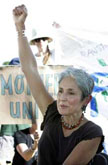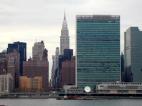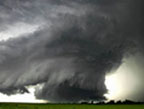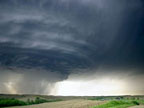Mrs. Sheehan and Ms. Baez at the United Nations
Aug 22nd, 2005 | By Counterweights Editors | Category: USA Today [UPDATED Thursday, August 25]. You can be excused if you woke up earlier this week and thought some intelligent designer had turned the clock back 40 years. Last Sunday night veteran Vietnam War protester Joan Baez gave a free concert for “about 500 … gathered …. a couple of miles away” from George W. Bush’s ranch in Crawford, Texas. Cindy Sheehan, the 48-year old mother of Iraq War casualty Casey Sheehan, who started this current gurgling anti-war protest, had been “in Los Angeles, where her 74-year-old mother was hospitalized after a stroke.” But she has now returned to Texas. Meanwhile, related deep thinkers are pointing to the United Nations in New York.
[UPDATED Thursday, August 25]. You can be excused if you woke up earlier this week and thought some intelligent designer had turned the clock back 40 years. Last Sunday night veteran Vietnam War protester Joan Baez gave a free concert for “about 500 … gathered …. a couple of miles away” from George W. Bush’s ranch in Crawford, Texas. Cindy Sheehan, the 48-year old mother of Iraq War casualty Casey Sheehan, who started this current gurgling anti-war protest, had been “in Los Angeles, where her 74-year-old mother was hospitalized after a stroke.” But she has now returned to Texas. Meanwhile, related deep thinkers are pointing to the United Nations in New York.
For more detail on the protests see an Associated Press report by Angela K. Brown that appeared in various permutations in various places Monday morning, including the Fort Worth Star-Telegram. A somewhat different but related report by Andrew Becker appeared in The Dallas Morning News. A more intriguing report again appears on the website of the Basque news and Information Channel in Spain. (It includes the intelligence, e.g., that “Sen. Chuck Hagel, a Nebraska Republican and a prospective 2008 presidential candidate, said the war in Iraq has destabilised the Middle East and is looking more like the Vietnam conflict in which he fought a generation ago.” And for a further update on the growing and apparently quite well-organized Camp Casey complex, which plans to stay in business “until Bush returns to Washington shortly before Labor Day,” see The Mercury News from San Jose, for August 23.)
 You can’t help wondering just what it means for the cold and cruel real world. And here two recent articles from the more specialized press offer parallel morsels of food for thought. The first is an article on “The New American Century” in the midsummer issue of the New York Review of Books, by former Undersecretary-General of the United Nations, Brian Urquhart. The second is an article by James Laxer – former chief Waffle protester of the New Democratic Party in Canada, from the days when Joan Baez was still so young and beautiful. It is quietly advertised on the cover of the Canadian magazine known as The Walrus, under the discreet small heading “America’s New Civil War.” But it talks a lot about the United Nations too …
You can’t help wondering just what it means for the cold and cruel real world. And here two recent articles from the more specialized press offer parallel morsels of food for thought. The first is an article on “The New American Century” in the midsummer issue of the New York Review of Books, by former Undersecretary-General of the United Nations, Brian Urquhart. The second is an article by James Laxer – former chief Waffle protester of the New Democratic Party in Canada, from the days when Joan Baez was still so young and beautiful. It is quietly advertised on the cover of the Canadian magazine known as The Walrus, under the discreet small heading “America’s New Civil War.” But it talks a lot about the United Nations too …
“Mrs. Sheehan’s questions … “
 Whatever else, Cindy Sheehan’s protest has connected with some throbbing pulse in America today. As Gwen Ifill said on PBS TV a week ago, “one mother’s stubborn vigil has now become the latest flash point in the debate over war in Iraq.” The ultimate answers may remain unclear, but something is blowing in the wind.
Whatever else, Cindy Sheehan’s protest has connected with some throbbing pulse in America today. As Gwen Ifill said on PBS TV a week ago, “one mother’s stubborn vigil has now become the latest flash point in the debate over war in Iraq.” The ultimate answers may remain unclear, but something is blowing in the wind.
It is also true that a rival pro-war “Fort Qualls” is now established in the vicinity of the Bush ranch, to counter the anti-war Camp Casey. Fort Qualls does seem to have notably smaller numbers as yet. But both camps are apparently home to growing groups of congenitally unhappy campers. (For the moment at least?) And the whole scene down around Crawford, Texas these days is no doubt a “media circus,” as observed last week in a compelling editorial from the Louisville Courier-Journal in Kentucky.
Even so, something of what the Louisville Courier-Journal has also called “Mrs. Sheehan’s questions” do seem to be getting through. Even if Camp Casey soon fizzles, as some in the mass media appear to think it has already, the same questions will still be getting through at last, and perhaps quite far beyond the world of Joan Baez. And Mrs. Sheehan’s questions are simple and direct: “Why did her son have to die? What is the cause that Mr. Bush calls noble? Why must more Americans be killed?”
 It is of course just the raw symbolism of all this that is so powerful. Mrs. Sheehan, that is to say, has not so suddenly gained a big spot in the current American public consciousness because of her brilliant and compelling policy views on what to do about the war in Iraq. She is just a middle-aged American mother, understandably distraught over her son’s death in the war, who is simply raising a point that has already become obvious enough to very large numbers of Americans – just from watching the TV news over the past several months.
It is of course just the raw symbolism of all this that is so powerful. Mrs. Sheehan, that is to say, has not so suddenly gained a big spot in the current American public consciousness because of her brilliant and compelling policy views on what to do about the war in Iraq. She is just a middle-aged American mother, understandably distraught over her son’s death in the war, who is simply raising a point that has already become obvious enough to very large numbers of Americans – just from watching the TV news over the past several months.
Whatever the right policy on Iraq may be, the current one in effect is palpably not working. Or, it is at least becoming increasingly hard to say how anything that is being achieved by current US policy in Iraq really does justify the death of Mrs. Sheehan’s son. (Or, yet again, as the Louisville Courier-Journal has noted as well: “Realism is taking hold elsewhere. Retired Gen. Barry McCaffrey returned from a recent visit to Iraq and said that the wheels are coming off.’ Public approval of Mr. Bush’s handling of Iraq is now in the range of 34 percent to 38 percent … Mr. Bush still thinks his bromides of staying the course’ are adequate. Mrs. Sheehan knows better, and that gives her protest value and strength.”)
 That is why, as Jon Stewart quietly alluded to on the Daily Show for Monday, August 22, it just does not matter what Cindy Sheehan herself thinks should be done about Iraq – regardless of what President Bush keeps repeating on TV. Or what she said several months ago at some left-wing rally in San Francisco. (E.g., “9/11 was their Pearl Harbor to get their neo-con agenda through and, if I would have known that before my son was killed, I would have taken him to Canada. I would never have let him go and try and defend this morally repugnant system we have. The people are good, the system is morally repugnant.”). Or just how much financial support Camp Casey has been and is still receiving from such noted left-wing agitators as the arch-capitalist prince of global currency markets George Soros.
That is why, as Jon Stewart quietly alluded to on the Daily Show for Monday, August 22, it just does not matter what Cindy Sheehan herself thinks should be done about Iraq – regardless of what President Bush keeps repeating on TV. Or what she said several months ago at some left-wing rally in San Francisco. (E.g., “9/11 was their Pearl Harbor to get their neo-con agenda through and, if I would have known that before my son was killed, I would have taken him to Canada. I would never have let him go and try and defend this morally repugnant system we have. The people are good, the system is morally repugnant.”). Or just how much financial support Camp Casey has been and is still receiving from such noted left-wing agitators as the arch-capitalist prince of global currency markets George Soros.
The point is just that an ordinary Mrs. America who has lost a son in the war has at last stood up and asked the increasingly obvious simple questions: “Why did her son have to die? What is the cause that Mr. Bush calls noble? Why must more Americans be killed?” Following an almost primordial political logic, Cindy Sheehan has just publicly drawn attention to the emperor’s tattered clothes – at a time when many of her fellow citizens have been privately thinking similar thoughts. And it may be that the mindless but staunch John Wayne rhetoric of “staying the course” on Iraq is just not going to work for the second Bush administration any longer. The real world of the troubled global village may finally be catching up with all those Cheney-Rumsfeld acolytes who have cast such aspersions on those who lack the will to transcend its boundaries in the past.
 (Or as the Republican Senator from Nebraska, Chuck Hagel, has also put it recently: “By any standard, when you analyse two and a half years in Iraq … we’re not winning.” Or again, as Senator Hegel said when asked about Army Chief of Staff Peter Schoomaker’s latest announcement that he is planning for as many as 100,000 troops in Iraq for four more years: “I don’t know where he’s going to get these troops … there is no way America is going to have 100,000 troops in Iraq, nor should it, in four years.”)
(Or as the Republican Senator from Nebraska, Chuck Hagel, has also put it recently: “By any standard, when you analyse two and a half years in Iraq … we’re not winning.” Or again, as Senator Hegel said when asked about Army Chief of Staff Peter Schoomaker’s latest announcement that he is planning for as many as 100,000 troops in Iraq for four more years: “I don’t know where he’s going to get these troops … there is no way America is going to have 100,000 troops in Iraq, nor should it, in four years.”)
Brian Urquhart’s alternative new American century…
 It is of course one thing to agree that current US policy in Iraq is not working – “by any standard,” as Senator Hagel has said. It is quite another thing to come up with a policy that will work, and be able to win enough US domestic support to actually be implemented. And that explains the current interest of “The New American Century” in the midsummer issue of the New York Review of Books, by former Undersecretary-General of the United Nations, Brian Urquhart.
It is of course one thing to agree that current US policy in Iraq is not working – “by any standard,” as Senator Hagel has said. It is quite another thing to come up with a policy that will work, and be able to win enough US domestic support to actually be implemented. And that explains the current interest of “The New American Century” in the midsummer issue of the New York Review of Books, by former Undersecretary-General of the United Nations, Brian Urquhart.
In this interesting and timely piece the long-experienced Mr. Urquhart is reviewing a new book by the long-experienced Washington foreign policy bureaucrat Richard N. Haass (The Opportunity: America’s Moment to Alter History’s Course). This book, Mr. Urquhart tells us: “can be read as a firm, if restrained, indictment of the foreign policy of the Bush administration.” And Mr. Urquhart himself just goes on to largely second the motion, with one crucial further thought tacked on at the end.
 As Urquhart explains, e.g., Richard Haass’s “credentials are impressive. He has served in the State Department and the Pentagon under Presidents Carter, Reagan, George H.W. Bush, Clinton, and George W. Bush.” And Haass “is convinced that it is an illusion to strive for a world dominated by American military superiority. Instead the aim should be to integrate other states into American-sponsored or American-supported efforts to deal with the challenges of globalization.'”
As Urquhart explains, e.g., Richard Haass’s “credentials are impressive. He has served in the State Department and the Pentagon under Presidents Carter, Reagan, George H.W. Bush, Clinton, and George W. Bush.” And Haass “is convinced that it is an illusion to strive for a world dominated by American military superiority. Instead the aim should be to integrate other states into American-sponsored or American-supported efforts to deal with the challenges of globalization.'”
These challenges include such things as suicide-bombing terrorism (and severe strains on the traditional energy sources of the modern economy). But Haass, as Mr. Urquhart explains, thinks that the notion of fighting a “war on terrorism” is just not helpful in the end. Terrorism “would be better understood, and treated, as a disease.” And: “As a general rule Haass believes that skillful diplomacy, in its broadest sense, is Washington’s best weapon in the twenty-first century, and that military force must be used only as a last resort.”
 Judging from vague reports on TV, some wits who still support the present Bush administration foreign policy have been attacking the notion of treating terrorism as a disease recently, urging, e.g., that such people as Mr. Haass and Mr. Urquhart are insanely recommending that terrorists should be sent to psychiatrists, and so forth. But if you think about, say, raw global poverty as part of the broader category of diseases in question – along with the natural and various “man-made” disasters that figure in modern emergency management – you seem to have something closer to what at least Mr. Urquhart appears to have in mind.
Judging from vague reports on TV, some wits who still support the present Bush administration foreign policy have been attacking the notion of treating terrorism as a disease recently, urging, e.g., that such people as Mr. Haass and Mr. Urquhart are insanely recommending that terrorists should be sent to psychiatrists, and so forth. But if you think about, say, raw global poverty as part of the broader category of diseases in question – along with the natural and various “man-made” disasters that figure in modern emergency management – you seem to have something closer to what at least Mr. Urquhart appears to have in mind.
In any case, Richard Haas’s most immediate point here is just that “expansive wars of choice,’ such as those in Vietnam and Iraq, that call for open-ended sacrifice for uncertain ends are simply not sustainable.'” And, as Mr. Urquhart explains, Mr. Haass goes on to worry about two other features of current US policy that he judges unsustainable – the “gamble on the indefinite willingness of China to hold vast quantities of dollars and Treasury bonds, thus enabling the United States to import far more than it exports and to run huge deficits;” and the international “perception that Americans do not have a decent respect for the opinions of mankind, fostered in the last four years by many gratuitous policy moves.”
 In his August 11, 2005 New York Review piece Brian Urquhart himself does largely just explain and agree with the main thrust of Richard Haass’s thinking on these and related matters. But in the last section of his article Urquhart adds a kind of crucial caveat or proviso. He has some questions about Mr. Haass’s “basic concept of world integration’ under United States leadership.” Any realistic prospect of this will depend, Mr. Urquhart thinks, on whether current “US policy can change and also to what extent US leaders can work through the United Nations and its agencies as well as through regional groups and NGOs. Such collaboration will be essential if US leadership is to be acceptable to governments that are, in theory at least, coequal sovereign members of those bodies.”
In his August 11, 2005 New York Review piece Brian Urquhart himself does largely just explain and agree with the main thrust of Richard Haass’s thinking on these and related matters. But in the last section of his article Urquhart adds a kind of crucial caveat or proviso. He has some questions about Mr. Haass’s “basic concept of world integration’ under United States leadership.” Any realistic prospect of this will depend, Mr. Urquhart thinks, on whether current “US policy can change and also to what extent US leaders can work through the United Nations and its agencies as well as through regional groups and NGOs. Such collaboration will be essential if US leadership is to be acceptable to governments that are, in theory at least, coequal sovereign members of those bodies.”
The customary Bush foreign policy line about the United Nations is that every time we try this it just doesn’t work. And besides, the United Nations is somehow un-American to start with. Mr. Urquhart might just say that given what the policy has been this is hardly surprising. But in a rather meandering conclusion he seems most concerned about quietly alluding to how the United Nations is itself largely an American invention (invented in San Francisco, so to speak, and still officially headquartered in the global financial capital of New York). And he points to the achievements of the great World War II generation of US leaders who did so much to help found the United Nations, and the World Bank and the International Monetary Fund and the Marshall Plan, and so forth. These, Mr. Urquhart seems to be suggesting, are the careers that US leaders of the 21st century should be trying to emulate.
James Laxer on just saying no to the new empire in Canada …
 James Laxer’s piece in the September 2005 issue of the Canadian magazine known as The Walrus does not make any specific references to either Brian Urquhart or Richard Haas. But it does say some things that sound rather like the concluding section of Urquhart’s piece in The New York Review. The formal title of Laxer’s article is “The Rising Fall of The American Empire.” And the upfront heading reads “Republican imperialism has left the US divided. Can a United Nations initiative save America from itself?”
James Laxer’s piece in the September 2005 issue of the Canadian magazine known as The Walrus does not make any specific references to either Brian Urquhart or Richard Haas. But it does say some things that sound rather like the concluding section of Urquhart’s piece in The New York Review. The formal title of Laxer’s article is “The Rising Fall of The American Empire.” And the upfront heading reads “Republican imperialism has left the US divided. Can a United Nations initiative save America from itself?”
Canada could conceivably be seen as a kind of marginal test case for what might broadly be called the UrquhartHaas theory of a viable US foreign policy for the 21st century. On the one hand, the United States and Canada are not exactly foreign countries to each other. Canada, as Goldie Hawn once pointed out in some Hollywood movie, is “like attached.” Or, as Homer Simpson says, Canada is just “America Junior.” Among many other such things, it was apparently a Canadian neo-con deep thinker who actually dreamt up the current US foreign policy concept of the “axis of evil,” etc., etc.
 On the other hand, as a result of assorted historical accidents, Canada is also, as a strange but quite practical matter, a separate country from the United States – or what Brian Urquhart would call an “in theory at least, coequal sovereign member” of the United Nations in its own right. And as the present UN secretary general Kofi Anan not so subtly observed on a recent visit to the most northerly part of North America, his organization is quite important to whatever realistic claims the current democratically elected government of Canada can lay to national sovereignty.
On the other hand, as a result of assorted historical accidents, Canada is also, as a strange but quite practical matter, a separate country from the United States – or what Brian Urquhart would call an “in theory at least, coequal sovereign member” of the United Nations in its own right. And as the present UN secretary general Kofi Anan not so subtly observed on a recent visit to the most northerly part of North America, his organization is quite important to whatever realistic claims the current democratically elected government of Canada can lay to national sovereignty.
On yet another hand again, however, Canadian national sovereignty is also bolstered by Canada’s separate membership in the so-called G8 group of leading industrial nations – which was meeting in Scotland during this past July’s latest big incident of suicide-bombing terrorism by Islamic extremists, in London. And Canada has gained this status largely because when an earlier G5 wanted to expand to include Italy in Western Europe, the United States also wanted Canada on board, to strengthen the North American team.
 Yet on a still further other hand – and floating out there somewhere on some enduring Walt-Whitman democratic vista of a real new world order – in spite of increasing North American economic integration, and even with the George W. Bush team at the control panel in Washington, Canada currently shows its foreign policy independence from the United States most boldly by officially staying out of the War in Iraq. (Unlike Canada’s old Anglo-American imperial bedfellows in the United Kingdom and Australia, but quite like the USA’s other Mexican partner in the now almost 12-year-old North American Free Trade Agreement.)
Yet on a still further other hand – and floating out there somewhere on some enduring Walt-Whitman democratic vista of a real new world order – in spite of increasing North American economic integration, and even with the George W. Bush team at the control panel in Washington, Canada currently shows its foreign policy independence from the United States most boldly by officially staying out of the War in Iraq. (Unlike Canada’s old Anglo-American imperial bedfellows in the United Kingdom and Australia, but quite like the USA’s other Mexican partner in the now almost 12-year-old North American Free Trade Agreement.)
Some say that this is just a Canadian foreign policy made in France. And it was certainly first installed a few years back now by a quite obviously French Canadian prime minister. Yet on some very final other hand again, Bill Clinton’s old golf buddy Jean Chretien would be more at home in Cajun Louisiana than on the Champs Elysees. Closer observers can point to the Liberal Party of Canada’s thirst for advice from the old liberal foreign policy establishment in the USA. (And Jean Chretien’s official excuse for staying out of Iraq was in fact that the war had not been properly sanctioned by the United Nations. Canada had earlier joined the UN-supported mission to Afghanistan, and Canadian forces are still in Afghanistan today.)
 The important point about all this for James Laxer is that, like quite substantial majorities of all Canadians in recurrent polls, he staunchly supports Canada’s independent sovereign decision to stay out of the current US-led coalition in Iraq – which Jean Chretien’s successor as prime minister and leader of the Liberal Party of Canada, Paul Martin, has also made clear will continue to be followed by his government. (So long as it remains in office of course. But it is equally hard to see at the moment how any conceivable alternative government could win and stay in office without some independent Canadian policy that is essentially the same. Despite what right-wing TV diva Ann Coulter thinks, Canada, unlike Australia, did not join the US “war of choice” in Vietnam either.)
The important point about all this for James Laxer is that, like quite substantial majorities of all Canadians in recurrent polls, he staunchly supports Canada’s independent sovereign decision to stay out of the current US-led coalition in Iraq – which Jean Chretien’s successor as prime minister and leader of the Liberal Party of Canada, Paul Martin, has also made clear will continue to be followed by his government. (So long as it remains in office of course. But it is equally hard to see at the moment how any conceivable alternative government could win and stay in office without some independent Canadian policy that is essentially the same. Despite what right-wing TV diva Ann Coulter thinks, Canada, unlike Australia, did not join the US “war of choice” in Vietnam either.)
The important point about Mr. Laxer’s analysis here, for the UrquhartHaas theory of a viable US foreign policy, is not that it follows any obvious parallel paths. Both the mood and many of the details in “The Rising Fall of The American Empire” are quite different from Urquhart’s piece in The New York Review. Going along with some kind of workable American leadership in Laxer’s case does not mean mouthing any identical rhetoric. But Laxer does seem to wind up at what amounts to pretty much the same destination as Brian Urquhart, and probably Richard Haass too. “If the US is so essential to maintaining order in the world, ” he asks, “is it not the world’s responsibility to ensure that it does not collapse? And must not the US, in turn, invite the world in?” And then, Mr. Laxer hopefully concludes in his penultimate sentences: “It may be that an enhanced and emboldened UN would provide the greatest protection to our beleaguered neighbour to the south, by relieving it of the burden of empire.”
Thee key questions … for the United States … and Canada …
 Reading both James Laxer’s and Brian Urquhart’s recent articles in The Walrus and The New York Review of Books side by side in this way finally seems to leave the reader with three key questions.
Reading both James Laxer’s and Brian Urquhart’s recent articles in The Walrus and The New York Review of Books side by side in this way finally seems to leave the reader with three key questions.
1. EVEN IF THERE IS A NEW AND MORE VIABLE US FOREIGN POLICY IN THE WINGS, HOW CAN THE GEORGE W. BUSH TEAM POSSIBLY CHANGE HORSES IN MIDSTREAM?
2. THE UNITED NATIONS WAS ORIGINALLY A LARGELY AMERICAN INVENTION. AND WON’T A NEW US FOREIGN POLICY THAT LEANS MUCH MORE ON THE UN JUST BE YET ANOTHER VERSION OF A NEW AMERICAN EMPIRE TOO?
3. THE CURRENT DYSFUNCTIONAL US FOREIGN POLICY HAS IN FACT ALSO BEEN A GREAT TONIC FOR CANADIAN NATIONAL DEVELOPMENT. SHOULDN’T OLD LEFT-WING CANADIAN NATIONALISTS LIKE JAMES LAXER ACTUALLY CONTINUE TO SECRETLY SUPPORT GEORGE W. BUSH?
Various counterweights contributors will no doubt be pondering these and related questions further, over the coming fall and winter season of 2005-2006 – which does seem to hold out intriguing prospects of further great events in the history of democracy in America, the global economy, the United Nations, and beyond.
Earlier reports …
CW EDITORS UPDATE ON CINDY SHEEHAN. Thursday, August 18, 2005. 7:00 PM EDT. PBS TV reports that groups across the USA held vigils in support of Cindy Sheehan’s protest near the Bush ranch in Texas last night. But the 48-year-old mother, whose soldier son was killed in Iraq, has for the time being left Texas herself, to be at the side of her mother, who has just suffered a stroke. Meanwhile, check out the August 16 editorial in the Louisville Courier-Journal from Kentucky:”Mr. Bush still thinks his bromides of staying the course’ are adequate. Mrs. Sheehan knows better, and that gives her protest value and strength.”
MORE UPDATE, Friday, August 19, 2005, 2 PM: Whatever else, it does look like Cindy Sheehan is turning into the kind of authentic protest folk hero of democracy in America that we haven’t really seen since the 1960s. Check out, e.g., the Times of London on Cindy Sheehan’s Terrible Week; Centre de mdias alternatifs du Qubec on polls showing strong support in the USA for the Sheehan protest; the Australian press on Cindy’s vow to head back to Texas as soon as possible; the Baltimore Chronicle on solidarity with Cindy on the east coast; the Seattle Times on “Cindy Sheehan’s Symbolism” on the west coast; and an Editor & Publisher report on the estimated 1,600 “local pro-Sheehan vigils held coast-to-coast” in the USA, on the night of August 17. The answer may remain far from clear, but something is blowing in the wind.
